Red Earth Read online
Page 5
‘… and to repeat that breaking news, the US Ambassador to South Africa, Anita Rosenfeld, and two of her bodyguards have been confirmed killed in a bomb blast that rocked downtown Durban this morning. The South African National Defence Force has been deployed on the streets and the city is in lockdown. As yet, no group has claimed responsibility.
‘Ambassador Rosenfeld was supposed to visit a hospice and attend a cocktail party on board a visiting US warship today, along with unspecified South African government representatives. It’s no secret that the US is keen to engage South Africa in its war on terror in other parts of the continent, but experts are already saying today’s attack, believed to have been carried out by a suicide bomber, means closer cooperation with America will make South Africa a target.’
It wasn’t him. Joseph exhaled long and hard through his nostrils as he tried to calm himself. The police he had passed were going to Durban. A bomb would keep them busy, but eventually someone would come looking for the child, if not the Fortuner. He needed to get rid of both of them. He toyed with the idea of driving to the nearest police station – the cops would not expect that – and offloading the baby on the street.
No, he reconsidered, too risky.
The vehicle itself he would stash at his cousin’s place. Themba Nyathi would not be happy to see Joseph, but if Themba complained or threatened to go to the police then Joseph would soon shut the sanctimonious young swot up.
Chapter 5
Egil Paulsen got out of the Audi and the vehicle, with his three men still on board, did a U-turn and drove off. Egil stood on the opposite side of the street from the man he knew as Bandile Dlamini. He had seen the former politician’s picture on the internet in dozens of online articles about the man’s political and business careers.
He was not the only serving or ex-politician to be involved in a corrupt deal. The problem with this deal, however, was that Egil was coming to it as the vendor, but he had nothing to sell.
Ideally he would have had his men with him, but Egil had sent Bilal, Ibrahim and Djuma to find the stolen Fortuner with a baby on board. Paulsen wasn’t worried about the imbalance in firepower, though – if his soon-to-be business partner had ever killed in the line of his dealings, Egil was sure it would not have been nearly as many men and women as he.
Egil took a few seconds to size up Dlamini. Egil was as white as Bandile was black, yet he considered himself just as African. He had been born in Port Shepstone, 120 kilometres south of Durban; his Norwegian forebears had come to South Africa in the 1880s, lured by the offer of land in the British colony of Natal. They had settled mostly around Egil’s birthplace.
He had grown up not in the cold, clean crispness of Scandinavian Europe, but amid the wild game and blood-red earth of Africa and its politics of hate. Egil’s grandfather had served with the South African Army in Italy during the Second World War, and his father had fought in South West Africa, now Namibia, and the early battles in Angola.
South Africa’s border war had ended too soon for newly conscripted Egil to see wartime service, but as a young soldier he had been deployed on township duties. He had seen the beatings and machete wounds inflicted by Zulu against Xhosa, people burned to death with necklaces of fuel-filled tyres. He had fired, first tear gas then bullets, into rioting youngsters, and he had killed.
He’d loved army life, while so many of his surfer and dagga-smoking comrades had hated it. But he’d felt cheated of real action and disillusioned by the direction South Africa was heading in. His parents, while not Afrikaners, were conservative supporters of the apartheid regime. When his military service was up Egil travelled to Europe, to see distant relatives in Norway, and in a bar got to drinking with some Norwegian conscript soldiers who were talking about travelling to Bosnia in the former Yugoslavia to fight Serbian aggression.
In Bosnia he’d joined the mujahideen, fighters from around the world aiding the Bosnian Muslims. Here he had tested himself in real combat, against armed men, and had become addicted to a life lived on the edge and converted to Islam. His faith had taken him to other war zones, to Chechnya where he had killed Russians, and Afghanistan where he had fought America and her allies and narrowly escaped capture in the Tora Bora mountains.
Egil walked towards the shebeen and Dlamini ambled slowly across the road in the same direction. The big man’s driver was in tow, carrying a green canvas safari travel bag in one hand. Although he had no rhino horn Egil had no intention of leaving without the money the driver was carrying in that bag, nor without another car so that he could catch up with his men.
The two Zulu men had entered the bar first. It was the most substantial structure in the market, constructed of brick and rendered with rough plaster and whitewash on the outside. The Starlight Lounge advertised cold Castle Lite and ‘fun times’. Inside, Egil knew, were two rooms, one with a cement-topped bar and the other with a pool table covered in ripped felt. In the rear, in a separate building, were five rooms side by side where the resident prostitutes plied their trade.
Egil closed one eye as he approached. Even before he entered, the smell of stale beer, disinfectant and vestiges of urine and vomit assaulted his senses and sensibilities. He drew a breath.
As he entered the room he noted Dlamini had taken up position with his back to the wall at a table beyond the pool table. A girl in a tight red dress darted out through the rear door and a man who had been about to take a stroke put the cue down on the torn felt of the table. He and his friend moved to the bar room. The music blaring from the speaker on the wall offended Egil almost as much as the smells and Dlamini, perhaps seeing him wince, called to the barman in Zulu. The music died.
Dlamini had told Egil he would be bringing two men, but there was no sign of the second. Egil wondered if he was hiding somewhere, waiting to spring a trap.
‘You’re empty-handed. Where did your car just go? Where is the stuff?’ Dlamini said without preamble. The driver stood behind his boss, the bag in his hand.
‘I don’t have it.’
‘You what?’
‘It was stolen.’
Dlamini’s hands, visible and resting on the scarred and cigarette-burned plastic tabletop, curled into fists. He looked at his watch. ‘You have wasted my time and I urgently need to be somewhere else. Tell me what happened, quickly.’
‘The vehicle carrying the stuff was stolen. It’s South Africa, it happens.’
‘I know what goes on in my own country. Where was it stolen?’
Egil considered the question a fair one. Who knew, perhaps Dlamini did, as some old reports had suggested, have a finger in car theft – perhaps he could reach out to some contacts. ‘On the N2, north of Durban. I have information that it may be headed this way, in fact. I have my men looking for it. The car’s owner has been in touch with the tracking company. Where’s your other man?’
‘Around. Watching us.’
Egil noted how Dlamini had looked up, briefly. Perhaps he didn’t know where his bodyguard was. ‘I need the money your driver has in that bag. I will deliver the horn to you once my men and I find it.’
Dlamini laughed. ‘You’re joking, of course.’
Dlamini glanced back and spoke softly in Zulu to his driver. What Bandile Dlamini didn’t realise was that Egil Paulsen had been raised in no small part by a Zulu gogo, a nanny who had been loving where his parents had been cold and cruel, and who had spoken to him in Zulu from the day he was born to the day he left home.
‘Take him,’ was what Dlamini had said to the driver.
Egil’s reflexes had been honed and tested on the bloodiest battlefields of his time. He had passed every one of those tests, won every one of those competitions to see who was quickest, the most accurate, the most ruthless. In one movement he drew the pistol from his belt and fired.
The first bullet caught the driver in the chest, the second his face. The money bag slipped
from the driver’s fingers as he tumbled backwards.
Even as he fired, Egil was dropping to one knee, to make himself a smaller target. Dlamini was pushing his big frame back from the table. Egil didn’t know whether the businessman was armed, but he didn’t want to wait to find out. He got one shot off, hitting the man in the right shoulder, but before he could put a second round into him a figure blocked the light from the back door of the shebeen. Egil dived and rolled behind the pool table, crawled two metres then popped up and put two rounds towards the door.
*
Mike Dunn ducked back out of the doorway. He moved just in time, as two shots punched the air where he had just been. The man with the white hair was too quick for him.
Mike tried to process the big picture while at the same time figuring out how not to get killed. It wasn’t easy. Mike heard a yelp of pain from inside.
‘Don’t come in here after me. I’ve got a hostage,’ said a voice from inside.
Mike had seen Dlamini take a bullet and clutch at his shoulder, so he assumed the white-haired man had him. Mike backed around the shebeen into the laneway again. He moved to the front of the bar and peeked around the corner.
The white man was crossing the road, walking backwards with one arm around Dlamini’s neck. The driver’s canvas bag, presumably full of cash, was slung from its long carry strap around the white man’s torso. Dlamini had his hand pressed to the bleeding hole in his shoulder.
The man with the white hair paused in the middle of the dirt road. People scattered to the shelter of the various stalls. He pressed the pistol harder into Dlamini’s head.
Mike looked behind him; Solly had sat Dlamini’s remaining man down in the alley. Mike had roughed him up, but had probably saved the man’s life.
‘Get ready to cover me,’ Mike said to Solly.
‘Aren’t we better just to sit tight? Not even a rhino horn deal is worth dying for.’
‘You’re right about that,’ Mike said, ‘besides, I want Dlamini alive, and if we don’t do anything the white-haired man will kill him as soon as he’s clear of town. He’s only keeping him alive now as a human shield because he must know Dlamini has a second man.’
Mike left Solly and the captured man and ran behind the row of market stalls. He glanced between the stands and stopped when he was opposite Dlamini’s car. The white-haired man, with Dlamini clenched in one arm, was moving more slowly now. Mike took a deep breath and raised his pistol, steadying it against the tin wall of a shack.
The man reached Dlamini’s car and backed up against it. He said something that Mike couldn’t hear.
‘Lawrence, come out,’ Dlamini called.
No chance, Mike thought to himself. Lawrence was presumably the man Solly was holding.
White-hair was smiling as he shoved Dlamini in the back. ‘Get down on your knees, hands behind your back. Keys.’
Dlamini did as ordered and took his keys from his pocket. The man snatched them. Mike steadied himself. Dlamini lowered his bulk down, slowly, and the man reached behind him and opened the driver’s side door of the car.
Mike took aim high, at the blond man’s chest. For a moment he wavered, wondering if he could shoot a man like this, in cold blood. Just then, his target forced his hand, by raising his own and pointing his pistol at the back of Dlamini’s head.
Mike squeezed the trigger. The white man’s body jerked, but a fraction of a second after he was hit he also fired, and Bandile Dlamini pitched face forward in the dirt. Mike fired again, but the man, who had dropped to one knee, was able to hoist himself up into the car. Mike couldn’t tell if he’d hit him or a near-miss had caused him to flinch.
Mike ducked back into the shadows as four or five rounds headed his way. Whether he had been hit or not, the man was still a danger.
More gunfire came from where Mike had left Solly and the fleeing man had to return the exchange in that direction as well. The engine on the BMW purred to life and the man floored the accelerator.
Mike looked around the corner of the shack and fired again. He saw two of Solly’s shots hit the car’s windscreen and he put another two shots into the passenger-side window. The black sedan fish-tailed on the dirt road and raced through the market place.
‘Dammit.’ With the car accelerating away, Mike strode out into the middle of the dirt road and, seeing no innocents in front of him, he emptied his magazine at the disappearing BMW.
Mike nodded grimly. They went to where Dlamini was lying in the middle of the road. Curious stallholders were now starting to venture out of their hiding places and onto the street.
A man had his phone out and was taking a photo. ‘You,’ Mike called to him, ‘call an ambulance.’
Mike dropped to his knee next to Dlamini, who groaned and held a hand to his shoulder. Blood seeped between his fingers. ‘You were lucky.’
Dlamini coughed and winced. ‘I don’t feel lucky. But he missed with his second shot, so thank you for that. I fell forward to make him think he had hit me.’
‘Find me something I can use to stop the bleeding,’ Mike said to Solly. ‘One of the sangomas should be able to help.’ Solly nodded and jogged to the nearest stall in search of a traditional healer.
‘I need a car,’ Dlamini said.
Mike took out his handkerchief and pressed it against the wound in Dlamini’s shoulder. ‘You’re not going anywhere until the police have finished with you. What was your business with that man?’
Dlamini looked into his eyes. ‘None of your business.’
‘Then let me help refresh your memory. He was the oke that was about to shoot you in the head before I winged him. He was the one you came here to buy rhino horn from.’
‘I came here to investigate a tip-off that a white man was selling rhino horn. I’m working with the police.’
‘There are no police here, and I busted your man with the vulture heads. That alone is enough to get you locked up.’
‘I know nothing about any vulture heads.’
Solly came to them with a couple of bandages and a compress made of some plant materials. ‘The sangoma says this will slow the bleeding.’
Mike tore away some of Dlamini’s tailored shirt and told the man to be still as he dressed the wound. ‘You can talk now or talk later, Mr Dlamini. Why were you buying rhino horn from him?’
‘I wasn’t buying anything. He had nothing to sell, but he robbed me.’
‘You’re selling out our country’s national heritage. I should kill you myself.’
‘Lies. I’ve been on the record opposing poaching. Anyway, the important thing now is that I get to my daughter.’
‘What about the money in the bag the man took?’ Mike asked.
‘The money was real, but that man was never supposed to get away with it. I was here to pretend to buy rhino horn from him and my men were going to catch him in the act.’
‘Interesting story, but why did you go ahead with your so-called sting when the police clearly haven’t pitched?’
‘It is no story. It is the truth. I wanted to catch a rhino horn trader. Please, you must help me. I have no car now and I need to get home to my daughter.’
‘Tell me, where did my bullet hit him?’
‘I’m not sure it did,’ Dlamini said. ‘Please, I need a car.’
‘Where’s your phone?’ Mike asked him.
‘He frisked me after he’d shot me. He stomped on my phone, destroyed it. Call her for me, take me to her.’
‘What’s your daughter’s name?’
‘Lerato.’
‘Give me her phone number.’ As Dlamini dictated the number, Mike punched it into the contacts section of his phone. When he was done he called to Solly.
‘Please …’
Mike looked down. Dlamini’s head dropped to the ground and he closed his eyes. He put his fingers on the man’
s neck; he had a pulse but his breathing was shallow.
‘Ambulance is coming,’ Solly said.
Mike’s phone vibrated in his hand. He didn’t recognise the number, but it had been a day of surprises. ‘Mike Dunn.’
‘Mike, howzit, my name’s John Buttenshaw from Coastal Choppers at Virginia Airport – we do the airborne tracking for Motor Track, the car monitoring people.’
Mike thought for a moment. ‘Oh, right. Your people passed on the information about the vultures. I appreciate it, but I’m busy with something else right now.’
‘No, no, wait, this is urgent! Did you go there, to the carcass and the dead vultures?’
‘Yes, I did. Tell your pilot thanks for his work.’
‘Her work. The carcass; it’s a crime scene, right?’
The man sounded young, panicked, his words fighting each other to escape his mouth. ‘Yes, at least it was before I burned it. Vultures are protected under law, and by the Zulu king. Technically it’s a capital offence under tribal law to kill a vulture – not that it means anything.’
‘Right, good, terrific,’ John said. ‘Mike, I need to talk to whatever police are with you now. This is really, really important.’
Mike sighed. ‘I’m not at the carcass any more. I’m at the Mona market, my second crime scene of the day, as it happens, but there are no police here, either. I haven’t been able to get through to them. All the numbers are busy or the cops I know are tied up in Durban because of the bomb. You heard about the bomb, right?’
‘Yes, of course. Damn. I really need to talk to some cops.’
‘So do I. What’s up?’ Mike squeezed the bridge of his nose with his thumb and forefinger as John explained about the stolen car and the missing baby. Only in Africa.
‘Our pilot’s getting low on fuel,’ John added. ‘She’s the one who found your carcass and the vultures; she burned a lot of gas keeping the birds away from the poison. But the Fortuner’s still on the move. It’s not far from you.’

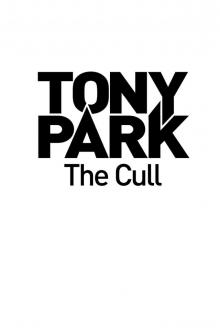 The Cull
The Cull Blood Trail
Blood Trail Red Earth
Red Earth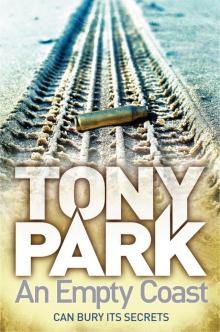 An Empty Coast
An Empty Coast Dark Heart
Dark Heart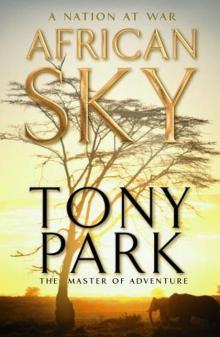 African Sky
African Sky The Delta
The Delta Captive
Captive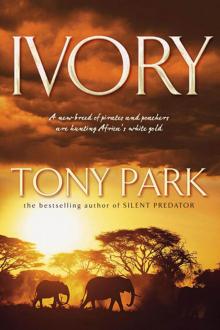 Ivory
Ivory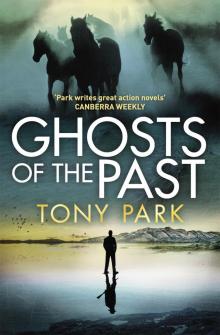 Ghosts of the Past
Ghosts of the Past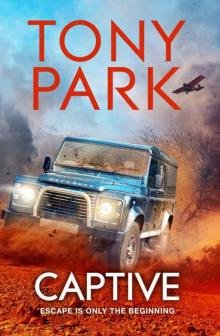 Captive_A High-octane And Gripping African Thriller
Captive_A High-octane And Gripping African Thriller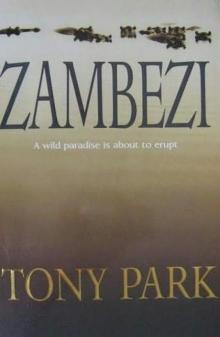 Zambezi
Zambezi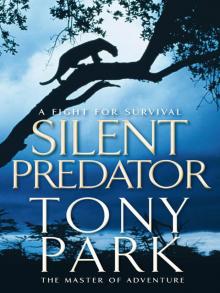 Silent Predator
Silent Predator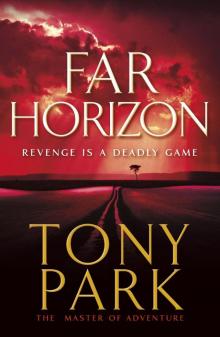 Far Horizon
Far Horizon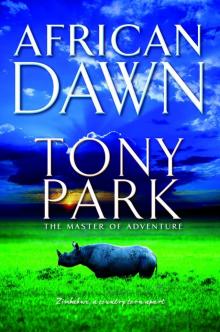 African Dawn
African Dawn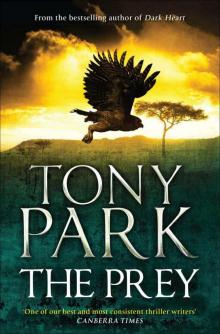 The Prey
The Prey Safari
Safari